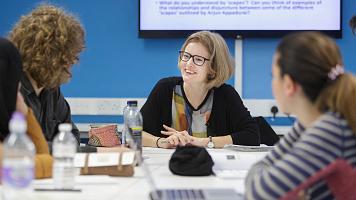MA
Human Rights, Culture & Social Justice
Content navigation menu
Why study MA Human Rights, Culture & Social Justice at Goldsmiths
This MA examines contemporary issues concerning justice. You will learn how to conceptualise and study the possibilities of human rights, going beyond legal formulations to look at the conditions in which human rights claims are made.
- In this Masters you will learn about how human rights are constructed, exploring framings of human rights through case studies. You will begin to practise some of the methodologies and methods that are currently used in NGOs and grassroots activist networks trying to remedy global injustices.
- The focus on culture that runs through the programme makes for an emphasis on concrete, situated practices and meanings. Can human rights contribute to a global culture in which injustices figure as ‘wrongs’? Or are human rights invariably skewed, constructing injustices in ways that suit international elites better than they suit people who are suffering? Do human rights do violence to local cultures? Are they an appropriate response to local violence? In this MA we contextualise the study of how human rights are constructed in micro-processes, in the media and face-to-face in relation to debates over macro-structures, processes of globalisation and the institutions of global governance.
- In terms of social justice, the MA is set up to study human rights beyond narrow, legalistic definitions. We look at what really makes a difference in terms of realising human rights in practice. Can human rights really be constructed in ways that challenge and overturn established social structures? Can rights be claimed in such a way that they can really protect us as human beings against the ‘creative destruction’ of global capitalism, state repression, the subjugation of women, and hatred and violence against minorities of all kinds – sexual, ethnic, religious?
- This course covers the disciplines of sociology, politics, anthropology, law, geography, English, literature, cultural studies, and criminology.
- You'll be joining our world-leading Department of Sociology. We've been rated in the top 10 for Sociology in the UK by QS World University Rankings 2023.
Contact the department
If you have specific questions about the degree, contact Kate Nash.
Length
1 year full-time or 2 years part-time
Fees
Home - full-time: £10350
Home - part-time: £5175
International - full-time: £20460
Department
Human rights mobilise millions of supporters across borders, inspiring passion and hope. And they operate at and between all the scales involved in globalisation: local, national, international, transnational. They are moral claims to justice. Although often associated with law, human rights are not the same as legal rights – human rights can be claimed where no legal rights are codified, even if changes in the law are invariably called for as part of attempts to realise human rights in practice.
Human rights are carried by different actors:
-
Grassroots social movements, small Non-Governmental Organisations (NGOs) and huge International Non-Governmental Organisations (INGOs)
-
Lawyers and judges
-
Bureaucrats and experts in Inter-Governmental Organisations (IGOs) – even, sometimes, national politicians
-
Journalists, novelists, translators, artists, filmmakers
These different actors are often at odds with each other in defining and defending particular justifications of what human rights are and should be.
What you'll study
In the first part of your degree, you will study the following compulsory modules. These will introduce you to key debates concerning human rights and teach you practical skills relevant to the field.
| Module title | Credits |
|---|---|
| Constructing Human Rights | 30 credits |
| Researching Human Rights | 30 credits |
How you'll be assessed
Assessment consists of coursework, extended essays, reports, presentations, practice-based projects or essays/logs, group projects, reflective essays, and seen and unseen written examinations.
Staff
The members of staff who are most closely associated with teaching the MA include:
The research interests of the people involved in teaching on the MA are especially linked to two centres at Goldsmiths:
Suggested reading
Suggested reading before you begin the course:
- A. An’Naim (2001) ‘Human Rights’ in J. Blau (Ed) Blackwell Companion to Sociology Oxford: Blackwell
- A. Brysk (2013) Speaking Rights to Power: Constructing Political Will Oxford: Oxford University Press.
- J. Cowan, M-B Dembour and R. Wilson (eds) (2001) Culture and Rights: Anthropological Perspectives Cambridge: Cambridge University Press.
- J. Donnelly (2013) Universal Human Rights in Theory and Practice Ithaca: Cornell University Press 3rd edition.
- K. Grewal (2017) The Socio-Political Practice of Human Rights: Between the Universal and the Particular London and New York: Routledge
- M. Freeman (2002) Human Rights Cambridge: Polity
- L. Morris (2013) Human Rights and Social Theory Basingstoke: Palgrave Macmillan
- K. Nash (2015) The Political Sociology of Human Rights Cambridge: Cambridge University Press.
If you would like additional reading ideas please visit the staff pages in the section above.
Careers
As issues of globalisation and justice are frequently in the media, and government policy in the UK, US, and elsewhere in Europe is now supposed to be guided by considerations of humanitarianism and human rights, there is a need for graduates with knowledge of human rights.
There are openings for careers in organisations including charities, humanitarian and human rights NGOs, and even multi-national corporations – many of which are now concerned with their image in terms of human rights.
Entry requirements
You should have (or expect to be awarded) an undergraduate degree of at least upper second class standard in a relevant/related subject.
You might also be considered for some programmes if you aren’t a graduate or your degree is in an unrelated field, but have relevant experience and can show that you have the ability to work at postgraduate level.
International qualifications
We accept a wide range of international qualifications. Find out more about the qualifications we accept from around the world.
If English isn’t your first language, you will need an IELTS score (or equivalent English language qualification) of 6.5 with a 6.5 in writing and no element lower than 6.0 to study this programme. If you need assistance with your English language, we offer a range of courses that can help prepare you for postgraduate study.
Fees and funding
Annual tuition fees
These are the PG fees for students starting their programme in the 2024/2025 academic year.
- Home - full-time: £10350
- Home - part-time: £5175
- International - full-time: £20460
If your fees are not listed here, please check our postgraduate fees guidance or contact the Fees Office, who can also advise you about how to pay your fees.
It’s not currently possible for international students to study part-time under a student visa. If you think you might be eligible to study part-time while being on another visa type, please contact our Admissions Team for more information.
If you are looking to pay your fees please see our guide to making a payment.
Funding opportunities
Explore the Goldsmiths scholarships finder to find out what funding you may be eligible for.
If you are a UK student you may be eligible for a postgraduate loan.
Meanwhile our Careers Service can also offer advice on finding work during your studies.
Paying your fees
Find out about paying your tuition fees.
Additional costs
In addition to your tuition fees, you'll be responsible for any additional costs associated with your course, such as buying stationery and paying for photocopying. You can find out more about what you need to budget for on our study costs page.
There may also be specific additional costs associated with your programme. This can include things like paying for field trips or specialist materials for your assignments. Please check the programme specification for more information.
How to apply
You apply directly to Goldsmiths using our online application system.
To complete your application, you will need to have:
- Details of your academic qualifications
- The email address of your referee who we can request a reference from, or alternatively a copy of your academic reference
- Copies of your educational transcripts or certificates
- A personal statement
You'll be able to save your progress at any point and return to your application by logging in using your username/email and password.
When to apply
We accept applications from October for students wanting to start the following September.
We encourage you to complete your application as early as possible, even if you haven't finished your current programme of study. It's very common to be offered a place that is conditional on you achieving a particular qualification.
Late applications will only be considered if there are spaces available.
If you're applying for funding, you may be subject to an earlier application deadline.
Selection process
As part of the admissions process, you may be offered an informal interview with the Programme Convenor.
Further guidance
Read our guide to applying for a postgraduate degree at Goldsmiths.





